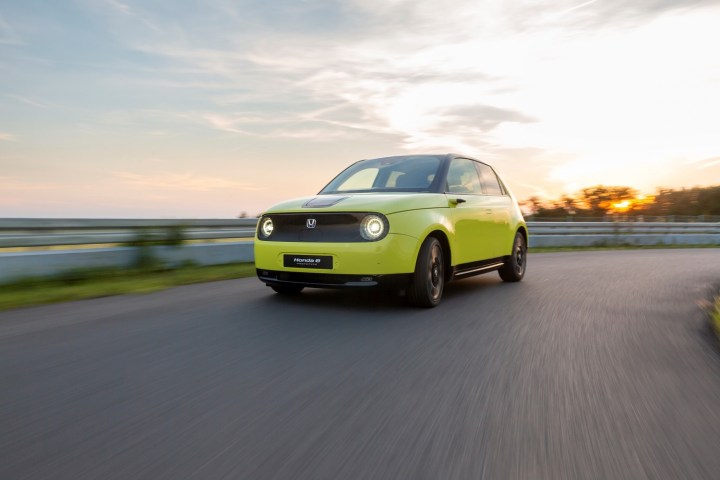
Honda’s first purpose-designed electric car, the adorable-looking E (pictured), made its debut during the 2019 Frankfurt Auto Show. The model was developed largely for overseas markets like Europe, but some of its powertrain technology could find its way into an America-bound model. That doesn’t mean Honda is about to open the electric car floodgates, though.
“EVs will not be mainstream,” company boss Takahiro Hachigo bluntly told industry trade journal Automotive News. His comments echo the ones made earlier in 2019 by Klaus Frölich, BMW’s chief engineer. Hachigo also cast doubts on autonomous tech. “The hurdles to battery electric vehicles and complete autonomous driving are still quite high,” he added.
While Hachigo acknowledged the need to make cleaner cars, he explained Honda will focus on gasoline-electric hybrid systems to reduce its fleetwide emissions. The technology is seen by some as a compromise, but it’s a good one because it reduces fuel consumption (and, consequently, emissions) without the range limitations and long charging times associated with many electric cars. The executive opined that regulations, not demand, is driving electric car sales.
“I do not believe there will be a dramatic increase in demand for battery vehicles, and I believe this situation is true globally. There are issues with infrastructure and hardware. There are different regulations in different countries, and we have to abide by them. So, it’s a must to continue research and development, but I don’t believe it will become mainstream anytime soon,” he stated. He also ruled out forging a partnership with a rival to develop battery-powered cars.
Honda’s approach to electrification differs from market to market. In Europe, it pledged to sell only electric and hybrid cars by 2022. The next-generation Fit (known as the Jazz in some regions) will be offered exclusively with a hybrid powertrain, though whether the model will return to American showrooms remains up in the air. In the United States, the perennially popular CR-V is getting a hybrid powertrain during the 2020 model year, though it won’t be standard, and unverified rumors claim similar technology will be offered on the Ridgeline sooner rather than later.
The company’s electrification road map is relatively well defined, but its plans to roll out semiautonomous and driverless technology remain murky. 2020 is around the corner, and the technology hasn’t merged into the mainstream yet.
“I don’t have any timeline or vehicle model in mind,” he replied when asked about Honda’s plans for level-three technology.
Editors' Recommendations
- Fake engine noises in electric cars need to die
- Mercedes’ electric eSprinter isn’t just greener, it’s better
- Honda previews future EV lineup with Zero Series concepts
- The fastest electric cars, ranked by 0-60 mph acceleration
- Apple wants to supercharge CarPlay, but here’s why carmakers won’t bite




